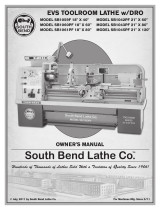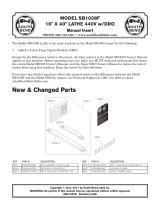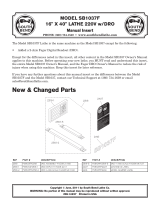Page is loading ...

5
• 418 Oiler
• 1 Gallon Nu-Clear Thread Cutting Oil
• 32 Transporter
Machine Assembly
WARNING
To prevent serious injury, proper assembly of the
Power Drive is required. Failure to mount the
Power Drive to a stable stand or bench may result
in tipping and serious injury. The following proce-
dures should be followed:
Mounting on No. 1206 Stand
1. Set up the 1206 Stand by opening legs and pushing
down on the tray. Legs should be stiff and the stand
should not wobble.
NOTE! The tristand leg stiffness can be increased or
decreased by the following procedure:
• Place stand upside down on a flat surface.
• Unlock tray so legs are loose.
• Locate the set screw on the tray leg support on the
rear leg
(Figure 3).
• Loosen the set screw to make the adjustment. To
increase stiffness, move the tray leg support up
towards the base. To decrease stiffness, move
the tray leg down towards the feet.
• Tighten the set screw (increasing leg stiffness
increases tray tension).
2. Mount power drive on the stand using bolts and wing
nuts
(Figure 3).
Figure 3 – 300 Power Drive Mounted on No. 1206 Stand
with 418 Oiler
Mounting 311A Carriage and Tools
1. Inspect the support bars to insure they are forward
and secured by two (2) retaining ring assemblies.
Retaining ring set screws must be tight
(Figure 4).
300 Power Drive
Spindle Weight
Catalog Model Speed
No. No. Description RPM Lb. Kg.
41855 300 Only 115V,25-60 Hz 38 94 43.0
75075 300 Only 115V,25-60 Hz 57 94 43.0
41860 300 Only 230V,25-60 Hz 38 94 43.0
75435 300 Only 230V,25-60 Hz 38 94 43.0
15682 300 115V,25-60 Hz 38 212 96.2
Complete 1/2″ – 2″ NPT
15722 300 115V,25-60 Hz 57 212 96.2
Complete 1/2″ – 2″ NPT
REV/OFF/FOR
Switch
Chuck Jaw
Handwheel
Set Screw (2)
Retaining
Ring Assy. (2)
No. 1206
Stand
Foot Switch
Wing Nut (4)
Bolt (4)
Pipe
Centering
Device
Rear Leg
Set Screw

1. Make sure Power Drive is unplugged and the direc-
tional switch is set to the OFF position
(Figure 3)
.
2. Clean the speed chuck jaws with a wire brush.
3. Inspect the jaw inserts for excessive wear. Refer to the
Maintenance Instructions if they need to be replaced.
NOTE! For plastic and coated work pieces, special jaw
inserts (Part No. 97365) should be used to pre-
vent damaging the workpiece.
4. Make sure the foot switch is present and attached to
the Power Drive
(Figure 3).
Do not operate the Power Drive without a
foot switch.
5. Inspect the power cord and plug for damage. If the
plug has been modified, is missing the grounding
pin or if the cord is damaged, do not use the Power
Drive until the cord has been replaced.
6. Inspect the Power Drive for any broken, missing,
misaligned or binding parts as well as any other con-
ditions which may affect the safe and normal opera-
tion of the machine. If any of these conditions are pre-
sent, do not use the Power Drive until any problem
has been repaired.
7. Lubricate the Power Drive spindle bearings if neces-
sary according to the Maintenance Instructions.
8. Use tools and accessories that are specifically
designed for your Power Drive and meet the needs of
your application. The correct tools and accessories
allow you to do the job successfully and safely.
Accessories suitable for use with other equipment
may be hazardous when used with this Power Drive.
9. Clean any oil, grease or dirt from all handles and
controls. This reduces the risk of injury due to a tool or
control slipping from your grip.
Inspect the cutting edges of your tools and dies. If
necessary, have them replaced prior to using the
Power Drive. Dull or damaged cutting tools and
dies can lead to binding, tool breakage and poor
quality threads.
10. Clean metal shavings and other debris from the chip
tray of the 418 Oiler. Check the level and quality of the
thread cutting oil. Replace or add oil if necessary.
NOTE! Thread cutting oil lubricates and cools the threads
during the threading operation. A dirty or poor
grade cutting oil can result in poor thread quality.
6
Figure 4 – No. 300 Power Drive with 311A Carriage, 360
Cutter, 341 Reamer and Die Head
2. Secure eyebolt to the 311A Carriage. Slide lever
arm through the eyebolt assembly and secure to
collar assembly with shoulder bolt
(Figure 4).
3. Tighten collar assembly thumb screw into groove
on support bar.
4. Install the 360 Cutter and 341 Reamer by inserting
arm in the slot provided in the carriage and secure
with the drive pin
(Figure 4).
5. Install 811A Die Head by inserting die head post
into the mating hole in the carriage.
NOTE! When fully inserted, spring-loaded ball will hold
die head in place.
Machine Inspection
WARNING
To prevent serious injury, inspect your Power
Drive. The following inspection procedures should
be performed on a daily basis:
300 Power Drive
No. 360
Cutter
No. 341
Reamer
No. 311
Carriage
w/Lever
Quick or Self-Opening
Die Head
Set Screw (2)
Pin
Collar
Assembly
Thumb
Screw
Shoulder Bolt
Eyebolt Assembly
Lever Arm
Support Bar (2)
Retaining Ring
Assembly (2)
Left Support
Arm
Right
Support Arm
WARNING

• Stand facing the directional switch.
• Use the foot switch with his left foot.
• Have convenient access to the directional switch,
tools and chucks without reaching across the
machine.
Machine is designed for one person operation.
9. Plug the Power Drive into the electrical outlet making
sure to position the power cord along the clear path
selected earlier. If the power cord does not reach
the outlet, use an extension cord in good condition.
WARNING
To avoid electrical shock and electrical fires, never use
an extension cord that is damaged or does not meet the
following requirements:
• The cord has a three-prong plug similar to shown
in Electrical Safety section.
• The cord is rated as “W” or “W-A” if being used
outdoors.
• The cord has sufficient wire thickness (14 AWG
below 25′/12 AWG 25′ - 50′). If the wire thickness is
too small, the cord may overheat, melting the cord’s
insulation or causing nearby objects to ignite.
To reduce risk of electrical shock, keep all
electrical connections dry and off the ground. Do not
touch plug with wet hands.
10. Check the Power Drive to insure it is operating properly.
• Flip the directional switch to FOR (Forward). Press
and release the foot switch. Check that the Power
Drive rotates in a counterclockwise direction as you
are facing the front chuck. Have the Power Drive
serviced if it rotates in the wrong direction or if the
foot switch does not control its stopping or starting.
• Depress and hold the foot switch. Inspect the mov-
ing parts for misalignment, binding, odd noises or
any other unusual conditions that may affect the safe
and normal operation of the machine. If such con-
ditions are present, have the power drive serviced.
• Flip the directional switch to REV (Reverse). Press
and release the foot switch. Check that the Power
Drive rotates in a clockwise direction as you are fac-
ing the chuck.
• Release the foot switch and flip the directional
switch to OFF.
7
Machine and Work Area Set-Up
WARNING
To prevent serious injury, proper set-up of the
machine and work area is required. The following
procedures should be followed to set-up the machine:
1. Locate a work area that has the following:
• Adequate lighting.
• No flammable liquids, vapors or dust that may ignite.
• Grounded electrical outlet.
• Clear path to the electrical outlet that does not
contain any sources of heat or oil, sharp edges or
moving parts that may damage electrical cord.
• Dry place for machine and operator. Do not use
the machine while standing in water.
• Level ground.
2. Clean up the work area prior to setting up any equip-
ment. Always wipe up any oil that may have splashed
or dripped from the machine or oiler to prevent slips
and falls.
3. Set up the Power Drive on a flat, level surface.
• For a Power Drive mounted on a 1206 Stand,
open legs of stand and push down on the tray.
Legs should be stiff and stand should not wobble.
NOTE! To increase or decrease leg stiffness, refer to
instructions on “Mounting On 1206 Stand”.
4. If the workpiece extends more than four (4) feet
beyond the Power Drive, use one or more pipe stands
to prevent tipping and the oscillation of the pipe.
5. If the workpiece extends beyond the Power Drive, set-
up guards or barricades to create a minimum of
three (3) feet of clearance around the Power Drive
and workpiece. This “safety zone” prevents others
from accidentally contacting the machine or workpiece
and either causing the equipment to tip or becoming
entangled in the rotating parts.
6. If necessary, fill the 418 Oiler with RIDGID Thread
Cutting Oil. Position the oiler under the front of the
Power Drive
(Figure 3).
7. Make sure FOR/OFF/REV switch is in the OFF posi-
tion.
8. Position the foot switch so that the operator can
safely control the machine, tools and workpiece. As
shown in
Figure 8,
it should allow the operator to
do the following:
300 Power Drive
WARNING
/



